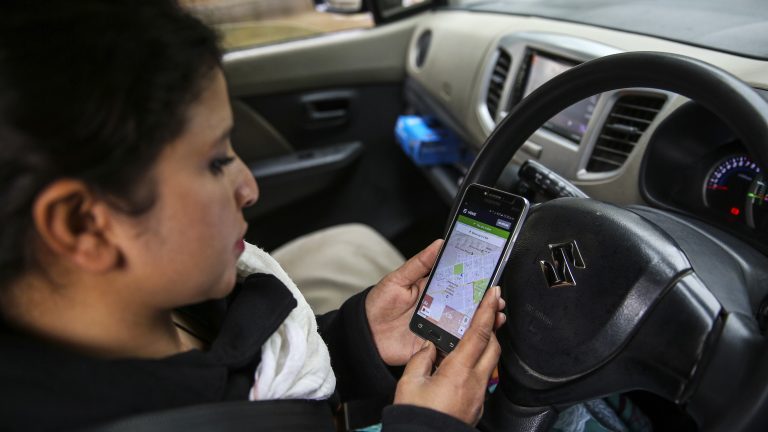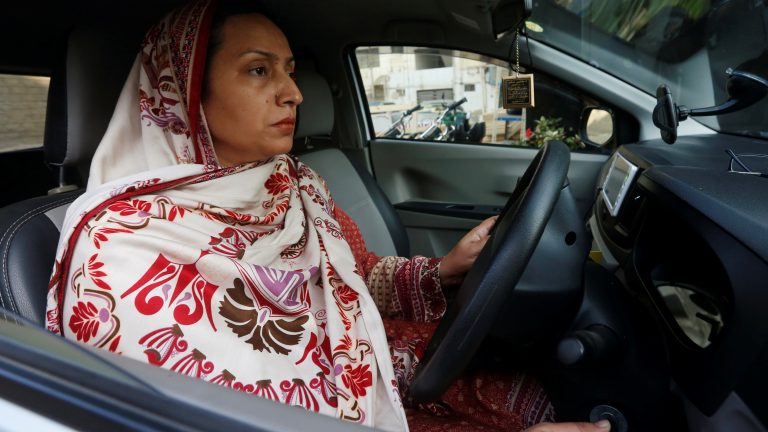Major platform businesses regularly launch campaigns to spotlight women gig workers. But women say most companies have backtracked on gender-based incentives.

- Platform companies in Pakistan have used female gig workers as part of ad campaigns for several years now.
- Researchers say women get locked out of the gig economy because they struggle to compete with men in the absence of gender-intentional incentives, especially as they juggle work and family responsibilities.
When Rukhsana Aslam signed up to work as a driver for Careem in 2018, she thought her financial woes were over. As part of an initiative to attract more women drivers to its platform, the ride-hailing giant had promised them a monthly payout of 72,000 rupees ($250) for a minimum of four rides per day, according to women who used to drive for Careem. The company had a dedicated safety helpline for women, and a WhatsApp group to address their issues that included the company’s managing director Junaid Iqbal, Aslam said.
Aslam, a single parent based in Karachi, would drop her son off at school at 8 a.m., drive around looking for rides, and be home by 11 a.m. “We could do other things and housework during the rest of the day. We didn’t have to struggle,” the 40-year-old told Rest of World. “It was guaranteed income.” By 2021, Aslam had become a poster child for Careem. Her face was plastered on the company’s digital marketing campaigns, accompanied by phrases like “breaking stereotypes” and “beating the odds.” She made appearances on podcasts where she talked about her first ride as a Careem driver and how she dealt with irate passengers. Last year, at a glitzy ceremony, she received an award for her commitment and service to the company.
Fast forward to April 2023: Aslam had quit driving. She says Careem abandoned her.
Internet platform businesses like Careem, Bykea, and Foodpanda had regularly highlighted their push for inclusion by bringing women into the gig workforce. For several years, usually around International Women’s Day, advertising campaigns invited more women to join the companies. Now, however, female riders or delivery workers are a rare sight on Pakistan’s streets.
According to several women who worked as gig workers for prominent startups, the companies drew them in by promoting incentives such as guaranteed monthly payouts, shorter work hours, and dedicated helplines, only to soon backtrack. Though platform gigs like ride-hailing are not an attractive option for women in many parts of the world, experts told Rest of World the absence of consistent gender-intentional initiatives makes matters worse.
“Women get locked out because they struggle to compete with men, especially juggling with unpaid labor and responsibilities,” Savita Bailur, research director at Caribou Digital, a research consultancy firm working to help build ethical digital economies, told Rest of World.
Careem, which is headquartered in Dubai, is one of the most successful tech startups in the Middle East, with Pakistan accounting for a large market share. It introduced women drivers in the country in December 2016. Seven months later, it had 17 women in its fleet. One of its biggest public relations victories came in 2018, when Saudi Arabia made it legal for women to drive, allowing Careem to add women drivers to its local fleets. The same year, Careem’s co-founder, Mudassir Sheika, pledged to hire 20,000 women drivers globally by 2020.
But former Careem drivers told Rest of World the company started rolling back its women-focused incentives in Pakistan in 2020, just as the business was acquired by Uber for $3.1 billion. “Eventually the 72,000 [rupees] became 60,000,” Aslam said. “There are no bonuses.”
“Men worked long hours, and I was expected to do the same, even though I had five kids at home and I am a single parent.”
Female gig workers told Rest of World platform businesses in Pakistan continue to launch and publicize initiatives to hire more women, but eventually fail at bringing about a real, sustainable change.
Rubiya Nadeem, 40, began working as a Bykea delivery driver in Lahore in August 2021. She told Rest of World financial circumstances compelled her to take up the gig. She was featured in articles and video interviews, and Bykea even gave her a brand-new bike. But a year later, in December 2022, Nadeem injured her back, and her doctor told her to quit riding bikes. She now runs a bike-training institute for women in Lahore, but none of her students are interested in gig work — and she doesn’t encourage them to join either.
“I won’t unless platforms make working conditions better for women,” Nadeem said. “I would have liked to be able to opt for package deliveries over customer pickups because men would cancel rides with me when they saw I was a woman, but the algorithm didn’t allow me to do that. Men worked long hours, and I was expected to do the same, even though I had five kids at home and I am a single parent.”
Bykea did not respond to Rest of World’s request for comment on this story.
The Global Gender Gap Report 2022 ranked Pakistan at 145 out of 146 countries in terms of women’s economic participation and other factors. Women comprise only 25% of Pakistan’s labor force — one of the lowest numbers in South Asia. Careem has around 1,700 women drivers registered on its platform in Pakistan, according to the company’s officials. But the prospects of female participation in the gig economy continue to remain bleak: On International Women’s Day this year, Careem launched a by-women-for-women bike service, but it never got off the ground.
In a phone interview with Rest of World, Careem’s spokesperson Nuzair Virani said the program hasn’t begun “due to a lack of sign-ups.” Although Virani didn’t directly respond to questions about why the company began withdrawing some of the incentives for women drivers, he said not all incentives were rolled back.

“Incentives for captains [Careem’s term for its drivers] are still in place. If you do a certain number of rides — 10 to 12 in a day — you get a fixed thing,” he said. “For women specifically, we have policies which are different. For example, if they cancel a ride because the area they’re picking up the passenger from is unsafe, we don’t have [cancellation] charges for them. For male captains, we do.”
Virani said Careem has a dedicated support team for female drivers. “They can call directly instead of going through the app,” he said.
Female gig workers told Rest of World they are frequently harassed. When Shaheen Gul began working for courier platform CallCourier in 2021, the company gave her a monthly payout of 35,000 rupees ($231), flexible working hours, and health insurance, she told Rest of World. “But I was booed by rowdy teenagers on the streets, leered at by shady men when I went to deliver parcels. It was emotional trauma,” she said. Three months in, Gul quit. “Gig work is always a last resort. It is never a priority,” she said.
“I was booed by rowdy teenagers on the streets, leered at by shady men when I went to deliver parcels. It was emotional trauma.”
Companies need to go beyond cosmetic fixes and do more to make gig work a more inclusive space, female workers told Rest of World. “[Foodpanda] should introduce specific timings for women,” said Rubab Jumani, who was Pakistan’s first female Foodpanda delivery driver. “They should let women take breaks. If you’re doing a 10-hour shift, you have to write an application saying I want a 10-minute break or a 5-minute break. There should be some consideration.”
Jumani was given awards for women’s empowerment, and was featured in ad campaigns and company press releases. The 28-year-old is currently on a break because of a spinal condition.
Not all companies are struggling to bring women into the gig workforce. In neighboring India, Urban Company has managed to recruit thousands of women as contractors. Around a third of the company’s 45,000 contract workers are women, and it says it plans to train at least 200,000 more by 2030.
Meanwhile, in Pakistan, new entrants can get discouraged from joining the platform business. Mamoona Idrees, who worked as a Careem driver for eight months in Lahore, told Rest of World she quit because she wasn’t able to earn enough to cover the cost of fuel. “Whatever I earned, it was like pocket money,” she said. “Motivation and appreciation [from passengers] was all that kept me going. But appreciation doesn’t pay the bills.”
